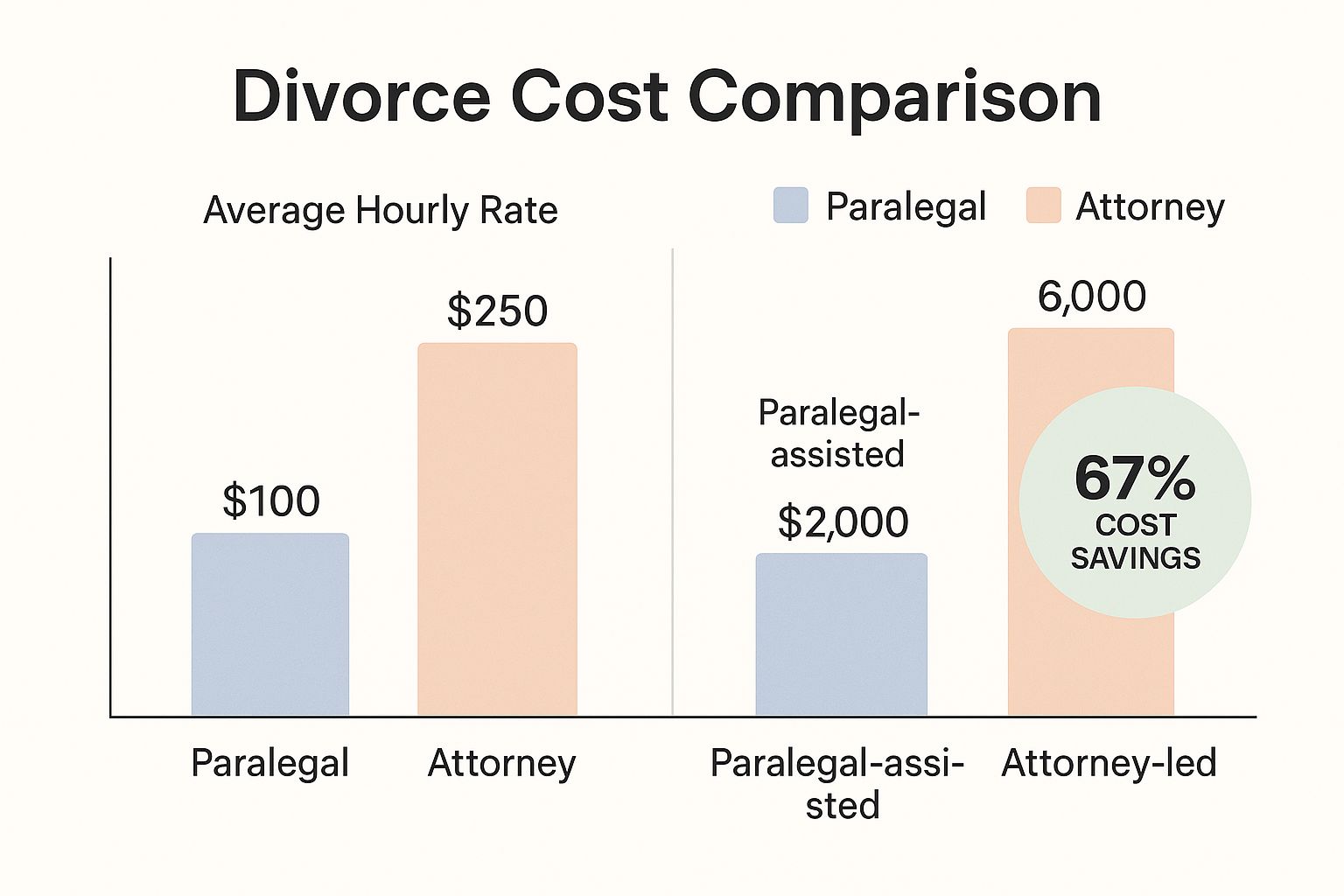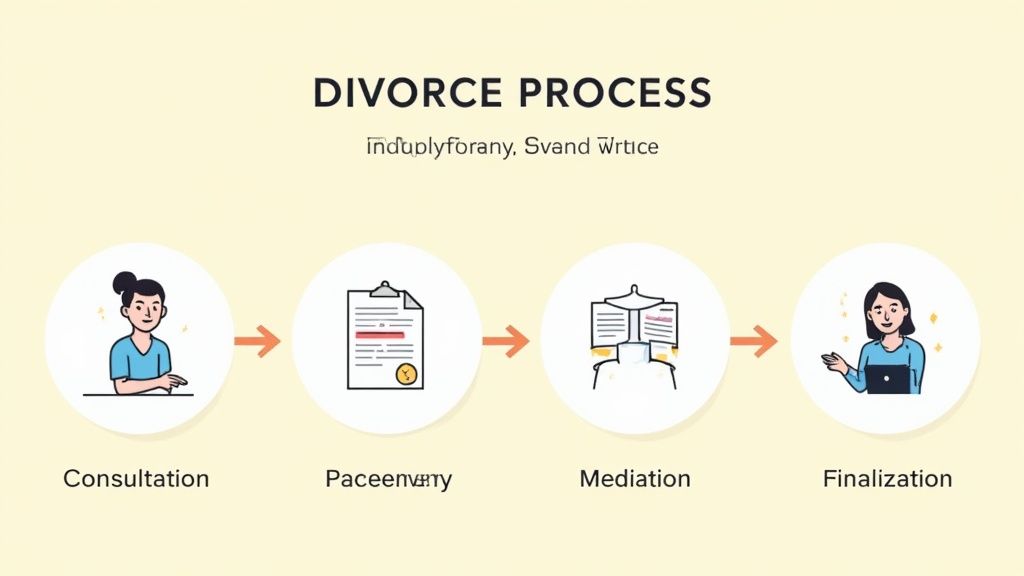
 18 minutes read
18 minutes read
Let's face it, when you think "divorce," your mind probably jumps straight to a high-stakes courtroom drama with two expensive lawyers and a bill that just keeps climbing. But what if I told you there’s another way? A smarter way. Paralegal services for divorce are a game-changing, cost-effective solution for handling the mountain of paperwork and procedural steps that simply don't need a lawyer's direct attention.
No one walks down the aisle thinking about divorce, and they certainly don't plan for the financial gut punch that often comes with it. The traditional, lawyer-heavy approach can feel like pouring gasoline on your savings account. That initial retainer, often around $500 per hour, is just the beginning.
The stark economics of divorce are well-known. Family law has grown into a massive industry, projected to reach $13.1 billion in the U.S. by 2025. With the average divorce costing somewhere in the neighborhood of $7,000, it’s no wonder people are searching for a smarter way to handle things.
This isn't an anti-lawyer rant. Far from it. An attorney's expertise is absolutely critical for tricky negotiations, legal advice, and court appearances. But paying a lawyer's rate for administrative work—like filing standard court forms or organizing financial statements—is like hiring a Michelin-star chef to make toast. It's madness.

Think of it this way: you aren't just looking for legal support. You're trying to find a path forward that doesn't leave you financially devastated before you've even started your next chapter.
The great news is, you don't have to mortgage your future to finalize your divorce. What you need is a process quarterback—someone who can manage all the procedural heavy lifting. This frees up your attorney to focus on the high-level strategy that truly requires their expertise. As you'll see, building the right team can completely change the financial equation of your case. To learn more, check out our guide on how to handle the legal aspects of divorce. This is precisely where paralegal services shine, offering a practical solution to an incredibly expensive problem.

Alright, let's get into the weeds. What does a divorce paralegal actually do? If you’re picturing a junior lawyer-in-training, you’re missing the point entirely. A great paralegal isn't a lawyer’s apprentice; they're a specialized professional—a process quarterback who knows the playbook inside and out.
They are the engine room of the divorce process. While your attorney is plotting the high-level strategy for complex negotiations, your paralegal is meticulously managing the mountain of tasks that make or break your case. Think of them as the unsung heroes who keep the entire operation from grinding to a halt over a missed deadline or a poorly worded form.
First things first: paralegals cannot give legal advice. Let’s just get that out of the way. If you need someone to tell you whether to accept a settlement offer or how to argue for custody, you need an attorney. Period.
But here’s the inside scoop: an estimated 80% of the work in a typical divorce is procedural, not strategic. It’s all about documentation, organization, and hitting deadlines. This is precisely where paralegal services for divorce become your secret weapon.
A seasoned paralegal handles the critical, time-consuming tasks that would otherwise cost you a fortune at an attorney's hourly rate. They are experts in:

They’re the ones who ensure the gears of your divorce keep turning smoothly. Without them, you’re either paying your lawyer hundreds of dollars an hour to fill out forms or you’re trying to do it yourself—and hoping you don't make a costly mistake.
By offloading this procedural work to a skilled paralegal, you free up your attorney to focus exclusively on high-value legal strategy. This isn’t just about saving money; it’s about using your legal budget intelligently.
You’re deploying your most expensive resource—the attorney—where they can have the biggest impact, while your paralegal flawlessly executes the foundational work. It's the smartest way to build your divorce team.
This is the big one. Getting this choice right is probably the single most important decision you'll make, and frankly, hiring the wrong professional is like calling a brain surgeon to fix a broken arm. It's wildly expensive and completely unnecessary.
Let's cut through the noise and have a blunt conversation about who you really need on your team and when.
The goal here isn't to bash lawyers. Far from it. An experienced attorney is an absolute necessity for the heavy stuff: giving you legal advice, representing you in court, and navigating really complex negotiations. They are your legal strategist, your fierce advocate in the courtroom. Think of them as the special forces you call in for a high-stakes mission.
But let’s be real. Most of a divorce isn't a dramatic, high-stakes courtroom battle. It's a mountain of paperwork.
This is where so many people get tripped up. They hear the word "divorce" and immediately think "lawyer for everything." Before they know it, they're paying $300 an hour or more for a highly-skilled attorney to fill out standard court forms. It’s financial madness.
A paralegal is your process quarterback—the expert in flawless execution, organization, and cost management. They know the procedural playbook inside and out, handling the administrative heavy lifting so your attorney (if you need one) can focus on winning the game.
This image really drives home the staggering cost difference between a typical attorney-led divorce and one that smartly uses paralegal services.

The numbers don't lie. Handing off the bulk of the administrative work to a paralegal can slash your total costs by as much as 67%. This isn't just about saving a few bucks; it's about putting thousands of dollars back into your pocket for your new beginning.
To help you see the roles more clearly, let's break down who does what in a typical divorce.
| Task or Role | Divorce Paralegal | Divorce Attorney |
|---|---|---|
| Giving Legal Advice | No. Can explain process, not advise strategy. | Yes. This is their primary role. |
| Drafting Paperwork | Yes. Their specialty. Prepares petitions, disclosures, etc. | Yes, but at a much higher cost. |
| Court Representation | No. Cannot speak for you in court. | Yes. Represents you before a judge. |
| Negotiating Settlements | No. Cannot negotiate on your behalf. | Yes. Key role in contested cases. |
| Managing Case Files | Yes. Expertly organizes and manages documents. | Yes, but their time is better spent on strategy. |
| Uncontested Divorce | Ideal. Manages the entire process. | Overkill, but can review the final agreement. |
| Contested Divorce | Excellent support. Manages discovery and documents. | Essential. Leads strategy and represents you. |
| Hourly Rate (Typical) | $75 – $150 per hour | $250 – $500+ per hour |
Ultimately, this isn't an either/or decision. It's about building a smart, cost-effective team.
So, when do you deploy each player? It’s simpler than you think. You’re building a team, not just hiring a single person.
You absolutely need an attorney when:
A paralegal is the smarter choice for:

Choosing between them isn't an either/or proposition. It's about using the right tool for the right job. You use a scalpel for surgery and a spreadsheet for finances—using an attorney for routine paperwork is just as illogical.

Let's get one thing straight: not all paralegals are created equal. Some are essentially glorified administrative assistants, fantastic at filing paperwork but not much else. Then there are the true professionals—the indispensable partners who will genuinely save you time, money, and a whole lot of stress.
Hiring the right paralegal is like bringing on a key player for a critical project, because that’s exactly what your divorce is. You’re not just checking a box; you’re vetting a professional who understands the local court system and can navigate its quirks without constantly running to your attorney (and your wallet) for every little thing. You need a process expert, not just a paper-pusher.
Think of this less like hiring a temp and more like scouting a starting player for your team. To separate the pros from the pretenders, you have to ask the right questions. Forget the generic stuff and dig into the specifics of how they actually work. This isn't the time to be shy.
Here are the non-negotiable questions you should ask any paralegal you're considering for your divorce:
Just as important as asking the right questions is knowing how to spot the warning signs. I've seen it happen too many times: a bad hire can create far more problems than they solve. If you enjoy redoing paperwork and explaining the same thing five times, by all means, pick the first person you find.

The single biggest red flag? A paralegal who offers legal advice. If they start telling you what you should do legally or predicting how a judge will rule, run, don't walk. They are not a lawyer, and crossing that line is both unethical and dangerous for your case.
On the other hand, here are the green flags that tell you you've found a real pro:
Hiring paralegal services for divorce is a serious business decision. Treat it that way. Do your due diligence, trust your gut, and bring someone on board who will be a genuine asset to your team.

Let's get right to it and talk about the elephant in the room: money. How much is a paralegal actually going to cost you during a divorce? The short answer is a whole lot less than putting your house on the line to cover an attorney's full-time rates.
This isn't just about pinching pennies; it's about being smart with your resources. We're talking about taking what feels like a massive, unpredictable expense and turning it into a manageable investment in your future. And trust me, the return isn't just financial—it's your peace of mind.
It’s no surprise that the global divorce service market is projected to hit $7.6 billion by 2032. A big reason for this growth is that people are waking up to more affordable online options and realizing they don’t have to go broke to get divorced. It’s a clear sign that people want smarter, less financially devastating solutions.
So, what should you really expect to see on an invoice? One of the best things about working with paralegals is that their fee structures are usually much more straightforward than the complex bills you might get from a traditional law firm.
You’ll typically run into one of these models:

The bottom line is this: strategically using a paralegal for the administrative heavy lifting can slash your total legal costs by 50-70%. No, that's not a typo. It's often the difference between a manageable bill and a mountain of debt.
Let's put this into a real-world context. Picture a relatively amicable divorce where you and your spouse are on the same page about the major issues. Instead of handing an attorney a retainer to cover 20 hours of work at $400/hour (a whopping $8,000), you build a more strategic team.
You hire a paralegal for 15 hours to handle all the paperwork, filing, and case management at $125/hour ($1,875). Then, you bring in an attorney for just 5 hours of high-level strategic advice and a final review of the agreement ($2,000).
Your grand total? $3,875. That’s less than half the cost. You can get a better sense of how these numbers break down by looking at typical virtual paralegal rates. It’s not about cutting lawyers out of the picture entirely; it’s about using their expensive time for what truly matters.
Let’s be honest. Divorce is an emotional minefield, but it's also a procedural one. The path is littered with tiny tripwires—missed deadlines, incorrect forms, and botched paperwork—that can blow up your timeline and your budget.
It’s easy to think you’re saving money by handling it all yourself. In reality, you might be setting yourself up for a much bigger, more expensive headache down the road.
Ever had paperwork rejected by a court clerk because you used the wrong font size? It happens. These aren't just minor slip-ups; they can completely derail a case, create unnecessary conflict, and force you to pay an attorney a hefty fee to clean up the mess. That cleanup bill is almost always higher than the cost of getting it right the first time.
A sharp paralegal acts as your first line of defense against these self-inflicted wounds. They are the detail-obsessed professionals who live and breathe court procedure. Their entire job is to make sure the administrative side of your divorce moves forward without a single hitch.

A paralegal doesn't just fill out forms. They prevent the small but costly mistakes that turn a straightforward process into a procedural nightmare. Think of them as the quality control expert for your divorce.
They’re the ones who double-check that every financial disclosure is correctly formatted and filed on time. They ensure you meet critical deadlines that could otherwise jeopardize your entire case. They also confirm your spouse has been properly "served," a small but essential step that people trying to do it themselves mess up constantly.
If you're curious about the level of precision this career demands, you can learn more about what it's like to work as a paralegal.
By managing these crucial details, paralegal services for divorce do more than just save you money—they save you from yourself. They handle the procedural headaches so you can focus on the big-picture emotional and financial decisions that will shape your future.
Alright, let's clear the air and tackle the questions that are probably swirling around in your head. I've been in this field for a long time, and I've heard just about every question you can imagine. Here are some straight, no-nonsense answers to the most common ones.
Let's get this one out of the way right off the bat: No. Absolutely not.
A paralegal's work happens strictly behind the scenes. They are not legally allowed to speak for you in front of a judge, present legal arguments, or advise you on how to plead your case. That’s a job reserved exclusively for a licensed attorney.
Think of a paralegal as the master of preparation. They're the ones who ensure your attorney walks into court with a perfectly organized case file, ready to fight for you.
Yes, but there's a huge caveat here. It’s not just safe, it's incredibly smart—but only as part of a team that's led by an attorney.
When you're in a contested divorce, fighting over assets, custody, or even sentimental items, you need a lawyer to call the shots. That's non-negotiable. But that doesn't mean you have to pay a lawyer's hourly rate for every single task. A skilled paralegal can save you a ton of money by handling the mountain of paperwork, organizing discovery documents, and preparing the detailed financial statements your attorney needs to build a winning strategy.

It helps to think of it like this: your attorney is the surgeon performing the operation. Your paralegal is the highly skilled surgical tech who makes sure every instrument is sterilized, laid out perfectly, and ready the moment the surgeon needs it. Both are absolutely critical for a successful outcome.
Finding a top-notch paralegal isn't like searching for a needle in a haystack, but you do need to know where to look.
A great place to start is by asking divorce attorneys for referrals. They always know the best independent paralegals in the area—the ones they trust with their own cases. You can also check with state or local paralegal associations, which often have member directories.
When you start interviewing candidates, be thorough.
Finding the right support shouldn't feel like a shot in the dark. At HireParalegals, we do the vetting for you. Our network is filled with pre-screened, experienced paralegals ready to jump in and provide the expert assistance you need. You can find your perfect match in as little as 24 hours.